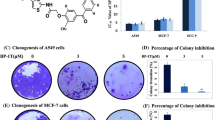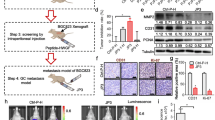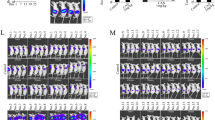Abstract
Since angiogenesis enables solid tumors, including pancreatic cancer (PaCa), to grow and metastasize, the development of anti-angiogenic agents is currently one of the urgent issues. Proteasome inhibitors are well known for inhibiting nuclear factor-kappa B (NF-κB) activity in various cancer cells, but little is known about their biologic mechanisms against angiogenesis in PaCa. We divided human PaCa cell lines into high-angiogenic (BxPC-3 and SW 1990) and low-angiogenic (MIA PaCa-2 and Capan-2) groups. The high-angiogenic PaCa cell lines constitutively expressed high NF-κB activity and produced high levels of vascular endothelial growth factor (VEGF) and interleukin 8 (IL-8). The conditioned media from BxPC-3 significantly enhanced both proliferation of and tube formation by human umbilical vein endothelial cells (HUVECs) and these enhancements were significantly inhibited by the proteasome inhibitor MG132 treatment. Collectively, MG132 blocked PaCa-derived VEGF and IL-8 production through inhibition of NF-κB activity. Thus, proteasome inhibitors may prove beneficial as anti-angiogenic therapy for PaCa. Our studies show that MG132, a proteasome inhibitor, significantly blocked pancreatic-cancer-associated angiogenesis through inhibition of NF-κB and NF-κB-dependent proangiogenic gene products VEGF and IL-8.





Similar content being viewed by others
Abbreviations
- PaCa:
-
Pancreatic cancer
- NF-κB:
-
Nuclear factor-kappa B
- VEGF:
-
Vascular endothelial growth factor
- IL:
-
Interleukin
- FCS:
-
Fetal calf serum
- HUVEC:
-
Human umbilical vein endothelial cell
- MTS assay:
-
Celltiter 96 Aqueous One Solution cell proliferation assay
- ELISA:
-
Enzyme-linked immunosorbent assay
- EMSA:
-
Electrophoretic mobility shift assay
- ANOVA:
-
Analysis of variance
- SD:
-
Standard deviation
- SNK test:
-
Student–Newman–Keuls test
- PI:
-
Proteasome inhibitor
References
Yeo CJ, Cameron JL, Lillemoe KD, et al. Pancreaticoduodenectomy for cancer of the head of the pancreas. 201 patients. Ann Surg. 1995;221:721–731. doi:10.1097/00000658-199506000-00011 (discussion 731–733).
Evans DB, Lee JE, Pisters PW, et al. Advances in the diagnosis and treatment of adenocarcinoma of the pancreas. Cancer Treat Res. 1997;90:109–125.
Pino SM, Xiong HQ, McConkey D, Abbruzzese JL. Novel therapies for pancreatic adenocarcinoma. Curr Oncol Rep. 2004;6:199–206. doi:10.1007/s11912-004-0050-1.
Karin M, Cao Y, Greten FR, Li ZW. NF-kappaB in cancer: from innocent bystander to major culprit. Nat Rev Cancer. 2002;2:301–310. doi:10.1038/nrc780.
Sovak MA, Bellas RE, Kim DW, et al. Aberrant nuclear factor-kappaB/Rel expression and the pathogenesis of breast cancer. J Clin Invest. 1997;100:2952–2960. doi:10.1172/JCI119848.
Bargou RC, Emmerich F, Krappmann D, et al. Constitutive nuclear factor-kappaB-RelA activation is required for proliferation and survival of Hodgkin’s disease tumor cells. J Clin Invest. 1997;100:2961–2969. doi:10.1172/JCI119849.
Wang W, Abbruzzese JL, Evans DB, Larry L, Cleary KR, Chiao PJ. The nuclear factor-kappa B RelA transcription factor is constitutively activated in human pancreatic adenocarcinoma cells. Clin Cancer Res. 1999;5:119–127.
Xiong HQ, Abbruzzese JL, Lin E, Wang L, Zheng L, Xie K. NF-kappaB activity blockade impairs the angiogenic potential of human pancreatic cancer cells. Int J Cancer. 2004;108:181–188. doi:10.1002/ijc.11562.
Beg AA, Baldwin AS Jr. The I kappa B proteins: multifunctional regulators of Rel/NF-kappa B transcription factors. Genes Dev. 1993;7:2064–2070. doi:10.1101/gad.7.11.2064.
Verma IM, Stevenson JK, Schwarz EM, Van Antwerp D, Miyamoto S. Rel/NF-kappa B/I kappa B family: intimate tales of association and dissociation. Genes Dev. 1995;9:2723–2735. doi:10.1101/gad.9.22.2723.
Palombella VJ, Rando OJ, Goldberg AL, Maniatis T. The ubiquitin-proteasome pathway is required for processing the NF-kappa B1 precursor protein and the activation of NF-kappa B. Cell. 1994;78:773–785. doi:10.1016/S0092-8674(94)90482-0.
Traenckner EB, Wilk S, Baeuerle PA. A proteasome inhibitor prevents activation of NF-kappa B and stabilizes a newly phosphorylated form of I kappa B-alpha that is still bound to NF-kappa B. EMBO J. 1994;13:5433–5441.
Liotta LA, Kohn EC. The microenvironment of the tumour-host interface. Nature. 2001;411:375–379. doi:10.1038/35077241.
Bussolino F, Mantovani A, Persico G. Molecular mechanisms of blood vessel formation. Trends Biochem Sci. 1997;22:251–256. doi:10.1016/S0968-0004(97)01074-8.
Folkman J. What is the evidence that tumors are angiogenesis dependent? J Natl Cancer Inst. 1990;82:4–6. doi:10.1093/jnci/82.1.4.
Folkman J. How is blood vessel growth regulated in normal and neoplastic tissue? G.H.A. Clowes memorial Award lecture. Cancer Res. 1986;46:467–473.
Matsuo Y, Sawai H, Ochi N, et al. Interleukin-1 alpha secreted by pancreatic cancer cells promotes angiogenesis and its therapeutic implications. J Surg Res. (in press).
Matsuo Y, Sawai H, Funahashi H, et al. Enhanced angiogenesis due to inflammatory cytokines from pancreatic cancer cell lines and relation to metastatic potential. Pancreas. 2004;28:344–352. doi:10.1097/00006676-200404000-00025.
Nawrocki ST, Bruns CJ, Harbison MT, et al. Effects of the proteasome inhibitor PS-341 on apoptosis and angiogenesis in orthotopic human pancreatic tumor xenografts. Mol Cancer Ther. 2002;1:1243–1253.
Nawrocki ST, Sweeney-Gotsch B, Takamori R, McConkey DJ. The proteasome inhibitor bortezomib enhances the activity of docetaxel in orthotopic human pancreatic tumor xenografts. Mol Cancer Ther. 2004;3:59–70.
Bishop ET, Bell GT, Bloor S, Broom IJ, Hendry NF, Wheatley DN. An in vitro model of angiogenesis: basic features. Angiogenesis. 1999;3:335–344. doi:10.1023/A:1026546219962.
Osugi T, Oshima Y, Fujio Y, et al. Cardiac-specific activation of signal transducer and activator of transcription 3 promotes vascular formation in the heart. J Biol Chem. 2002;277:6676–6681. doi:10.1074/jbc.M108246200.
Folkman J. Angiogenesis and angiogenesis inhibition: an overview. EXS. 1997;79:1–8.
Brown LF, Berse B, Jackman RW, et al. Expression of vascular permeability factor (vascular endothelial growth factor) and its receptors in adenocarcinomas of the gastrointestinal tract. Cancer Res. 1993;53:4727–4735.
Itakura J, Ishiwata T, Friess H, et al. Enhanced expression of vascular endothelial growth factor in human pancreatic cancer correlates with local disease progression. Clin Cancer Res. 1997;3:1309–1316.
Shi Q, Le X, Abbruzzese JL, et al. Constitutive Sp1 activity is essential for differential constitutive expression of vascular endothelial growth factor in human pancreatic adenocarcinoma. Cancer Res. 2001;61:4143–4154.
Shi Q, Abbruzzese JL, Huang S, Fidler IJ, Xiong Q, Xie K. Constitutive and inducible interleukin 8 expression by hypoxia and acidosis renders human pancreatic cancer cells more tumorigenic and metastatic. Clin Cancer Res. 1999;5:3711–3721.
Xie K. Interleukin-8 and human cancer biology. Cytokine Growth Factor Rev. 2001;12:375–391. doi:10.1016/S1359-6101(01)00016-8.
Tischer E, Mitchell R, Hartman T, et al. The human gene for vascular endothelial growth factor. Multiple protein forms are encoded through alternative exon splicing. J Biol Chem. 1991;266:11947–11954.
Ema M, Taya S, Yokotani N, Sogawa K, Matsuda Y, Fujii-Kuriyama Y. A novel bHLH-PAS factor with close sequence similarity to hypoxia-inducible factor 1alpha regulates the VEGF expression and is potentially involved in lung and vascular development. Proc Natl Acad Sci USA. 1997;94:4273–4278. doi:10.1073/pnas.94.9.4273.
Flamme I, Frohlich T, von Reutern M, Kappel A, Damert A, Risau W. HRF, a putative basic helix-loop-helix-PAS-domain transcription factor is closely related to hypoxia-inducible factor-1 alpha and developmentally expressed in blood vessels. Mech Dev. 1997;63:51–60. doi:10.1016/S0925-4773(97)00674-6.
Stein I, Itin A, Einat P, Skaliter R, Grossman Z, Keshet E. Translation of vascular endothelial growth factor mRNA by internal ribosome entry: implications for translation under hypoxia. Mol Cell Biol. 1998;18:3112–3119.
Akiri G, Nahari D, Finkelstein Y, Le SY, Elroy-Stein O, Levi BZ. Regulation of vascular endothelial growth factor (VEGF) expression is mediated by internal initiation of translation and alternative initiation of transcription. Oncogene. 1998;17:227–236. doi:10.1038/sj.onc.1202019.
Le X, Shi Q, Wang B, et al. Molecular regulation of constitutive expression of interleukin-8 in human pancreatic adenocarcinoma. J Interferon Cytokine Res. 2000;20:935–946. doi:10.1089/10799900050198372.
Shi Q, Le X, Wang B, et al. Regulation of vascular endothelial growth factor expression by acidosis in human cancer cells. Oncogene. 2001;20:3751–3756. doi:10.1038/sj.onc.1204500.
Huang S, Pettaway CA, Uehara H, Bucana CD, Fidler IJ. Blockade of NF-kappaB activity in human prostate cancer cells is associated with suppression of angiogenesis, invasion, and metastasis. Oncogene. 2001;20:4188–4197. doi:10.1038/sj.onc.1204535.
Sawai H, Funahashi H, Okada Y, et al. Interleukin-1alpha enhances IL-8 secretion through p38 mitogen-activated protein kinase and reactive oxygen species signaling in human pancreatic cancer cells. Med Sci Monit. 2005;11:BR343–350.
Mizukami Y, Jo WS, Duerr EM, et al. Induction of interleukin-8 preserves the angiogenic response in HIF-1alpha-deficient colon cancer cells. Nat Med. 2005;11:992–997.
Fahy BN, Schlieman MG, Mortenson MM, Virudachalam S, Bold RJ. Targeting BCL-2 overexpression in various human malignancies through NF-kappaB inhibition by the proteasome inhibitor bortezomib. Cancer Chemother Pharmacol. 2005;56:46–54. doi:10.1007/s00280-004-0944-5.
Dong QG, Sclabas GM, Fujioka S, et al. The function of multiple IkappaB: NF-kappaB complexes in the resistance of cancer cells to Taxol-induced apoptosis. Oncogene. 2002;21:6510–6519. doi:10.1038/sj.onc.1205848.
Arlt A, Vorndamm J, Breitenbroich M, et al. Inhibition of NF-kappaB sensitizes human pancreatic carcinoma cells to apoptosis induced by etoposide (VP16) or doxorubicin. Oncogene. 2001;20:859–868. doi:10.1038/sj.onc.1204168.
Alberts SR, Foster NR, Morton RF, et al. PS-341 and gemcitabine in patients with metastatic pancreatic adenocarcinoma: a North Central Cancer Treatment Group (NCCTG) randomized phase II study. Ann Oncol. 2005;16:1654–1661. doi:10.1093/annonc/mdi324.
Arlt A, Gehrz A, Müerköster S, et al. Role of NF-kappaB and Akt/PI3 K in the resistance of pancreatic carcinoma cell lines against gemcitabine-induced cell death. Oncogene. 2003;22:3243–3251. doi:10.1038/sj.onc.1206390.
Tong Z, Kunnumakkara AB, Wang H, et al. Neutrophil gelatinase-associated lipocalin: a novel suppressor of invasion and angiogenesis in pancreatic cancer. Cancer Res. 2008;68:6100–6108. doi:10.1158/0008-5472.CAN-08-0540.
Wente MN, Eibl G, Reber HA, Friess H, Büchler MW, Hines OJ. The proteasome inhibitor MG132 induces apoptosis in human pancreatic cancer cells. Oncol Rep. 2005;14:1635–1638.
Fan XM, Wong BC, Wang WP, et al. Inhibition of proteasome function induced apoptosis in gastric cancer. Int J Cancer. 2001;93:481–488. doi:10.1002/ijc.1373.
Zhang Y, Shi Y, Li X, et al. Proteasome inhibitor MG132 reverses multidrug resistance of gastric cancer through enhancing apoptosis and inhibiting P-gp. Cancer Biol Ther. 2008;7:540–546.
Acknowledgments
The authors would like to thank Karen Phillips from the Department of Scientific Publications for carefully reviewing this manuscript. This research was supported in part by The University of Texas M.D. Anderson Cancer Center Physician Scientist Program Award (to SG) and NIH grant CA16672 (Cancer Center Support Grant to M.D. Anderson Cancer Center).
Author information
Authors and Affiliations
Corresponding author
Rights and permissions
About this article
Cite this article
Matsuo, Y., Sawai, H., Ochi, N. et al. Proteasome Inhibitor MG132 Inhibits Angiogenesis in Pancreatic Cancer by Blocking NF-κB Activity. Dig Dis Sci 55, 1167–1176 (2010). https://doi.org/10.1007/s10620-009-0814-4
Received:
Accepted:
Published:
Issue Date:
DOI: https://doi.org/10.1007/s10620-009-0814-4




